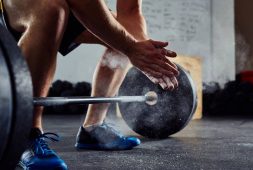
Group exercise classes are incredibly popular. People enjoy them because aside from the amazing workout, the energy and music – if any – tend to pump people up. And considering how much everybody sweats, you just know that tons of calories are being burned! Usually, you have an app or your apple watch that tells you just how many you’ve managed to burn too, but did you ever wonder why some people burn more than you, even if you’re doing the exact same workout?
That’s because your metabolism is responsible for how many calories you burn. While the word ‘metabolism’ is considered an umbrella term for the process of your body breaking down nutrients to use for energy, fuel growth, and more, there’s a lot of science behind it.
According to virtual functional medicine practitioner, Anya Rosen, RD, who’s based in New York City, “There is a constant ebb and flow of reactions that build or repair our body (anabolism) and reactions that break down food and energy stores for fuel (catabolism).”
She adds, “It is an extremely complex topic that is very challenging to research.”
While there are a number of factors that are vital to how slow or fast you are able to burn calories at any given time, experts share that these six factors are the ones with the greatest impact on how many calories you actually can burn while working out.
1. Your Body Weight
As explained by San Francisco-based certified strength and conditioning specialist and performance coach at Future, Kyle Gonzalez, “Generally, the more you weigh, the more calories you’ll burn per session. Calories are just a measure of energy, so the more you weigh, the more energy it takes to move your body.” In other words, if you weigh more, you’ll also burn more calories since there is a bigger energy expenditure as you move.
In addition, those with bigger bodies also have bigger internal organs, which include the heart, lungs, kidneys, and liver. This is also a significant factor when it comes to how many calories people burn both at exercise and at rest since these organs and their functions need energy to work. This is another reason for weight loss being so complicated. Since the body burns less calories as you lose weight, it can also lead to a weight loss plateau, or at other times, regaining the lost weight. Other times, there can also be physiological adaptations such as the body’s tendency to burn stored fat for energy, which is called fat oxidation. When this happens, there is more hunger because of higher levels of the hormone ghrelin, which also leads to less satiety, when the hormone leptin dips.
If you have issues with weight loss and hitting plateaus, consider seeing a registered dietitian to help you reach your goals.
2. Your Muscle Mass
The next factor, according to experts, is muscle mass. But this is a bit trickier, they explain, since those with more muscle mass will burn more calories than those who weigh the same but have less muscle. London-based private practice sports nutritionist, Jenaed Brodell, RD, shared, “Muscle tissue burns more calories than fat tissue.”
Experts also chime in about how many calories a pound of muscle will burn, and that they are usually majorly overstated. In reality, ‘a pound of muscle burns about five calories per day, whereas a pound of fat burns about two calories per day.’
Simply explained, having more muscle mass will also increase the total calorie burn since your body requires a higher production of energy to support the higher rate of muscle contractions during exercise. So if you want to enhance your calorie burn, step up your strength-training game. Brodell adds, “Evidence shows that lifting weights burns more fat [than cardio exercise] and has more promising long-term results.”
3. Your Gender At Birth
Gonzalez shares, “Generally, men burn more calories at rest and during exercise than women.” That’s because they are generally bigger than women, while also having more muscle mass than women of the same weight and age. He also says, “Males generally burn 5 to 10 percent more calories than females at rest, and this percentage usually increases with exercise.”
And even if women can add more muscle mass as they do strength training, precisely because of the physiological differences between men and women, females are just not as lean as men. Brodell explains, “Women are genetically predisposed to lay down more fat to support hormone production and childbearing.”
Since body fat is also essential for storing energy, supporting key functions like growth, hormone production, immunity, metabolism, and reproduction, they are help in protecting internal organs. And while the American Council on Exercise (ACE) says that ‘men need at least 2 to 5 percent body fat to support health,’ women, on the other hand, ‘need a minimum of 10 to 13 percent.’
Gonzalez suggests, rather than worrying about how your gender affects your calorie burn, think about what you can do. He says, “The bottom line is that men and women should focus on building muscle and improving cardiovascular health with a well-balanced cardio and strength-training program.”
4. Your Age
Brodell shares, “As we age, we tend to lose muscle mass. After age 30, you begin to lose as much as 3 to 5 percent of your muscle mass per decade.” Although experts aren’t exactly sure why this is, a published review was released in a 2017 copy of Ageing Research Reviews that explained ‘it’s likely because your body becomes more resistant to hormones that promote the protein synthesis that’s key to muscle maintenance. This loss of muscle mass lowers your metabolic rate – the speed at which you burn calories – at rest and during exercise.’
Meanwhile, another study published in Science in August of 2021 that talks about their findings on metabolic rate, and how rather than it declining throughout adulthood, it actually plateaus from 20 to 60, then it begins to decline. But regardless of the findings, it doesn’t mean that everyone’s calorie burn manages to stay constant all throughout adulthood.
Rosen explains, “This study on daily energy expenditure through the human life course is interesting, but it is not necessarily definitive proof that our understanding of metabolism is wrong.” She also said that it’s basically impossible to perfectly quantify metabolism, especially since aging comes with multiple changes in human physiology.
We can’t stop ourselves from aging, that’s just life, but you can help by preserving or increasing your muscle mass by doing regular strength training. Gonzalez reiterates, “Strength training can help you increase your resting metabolic rate, which helps you burn more calories at rest over time.”
5. Your Fitness Level
Have you noticed that the more often you do a certain type of workout, it seems to get easier and easier? That’s because your body actually adapts over time, allowing you to do more with practice.
But on the contrary, it can also affect the number of calories you burn. Gonzalez explains, “As your body adapts to training, you will burn less calories with the same workouts. From your lungs to your muscles to your heart to your brain, your body becomes more efficient as you become more fit.”
This could also explain why newbies may burn a significant amount more of calories than someone doing the same workout. This is also why making changes to your routine won’t only increase your fitness level, but it can possibly help you burn more calories.
6. Your Training Intensity
When it comes to training intensity, it’s possible that two people, despite doing the same workout, aren’t necessarily doing the same workout. That’s because one might be doing it at a much higher intensity than the other.
According to the Department of Health and Human Services (DHHS), targeting just 150 minutes of low-intensity workouts could already yield quite a big number of health benefits such as better sleep, lower blood pressure, reduced anxiety, increased cardiovascular fitness, and even a lowered risk of certain chronic conditions. In addition, adding other higher-intensity exercises into your workout routine can boost your calorie burn as well.
At the end of the day, experts share that people shouldn’t worry too much about the things that they can’t control. Instead, they should look at the endless benefits of exercise that go beyond burning calories. Rather, choose the exercises you enjoy and that are manageable and sustainable to gain the most from it. Brodell shares, “The type of exercise that is better for a person ultimately depends on that person’s goals, physical fitness, and capabilities.”



